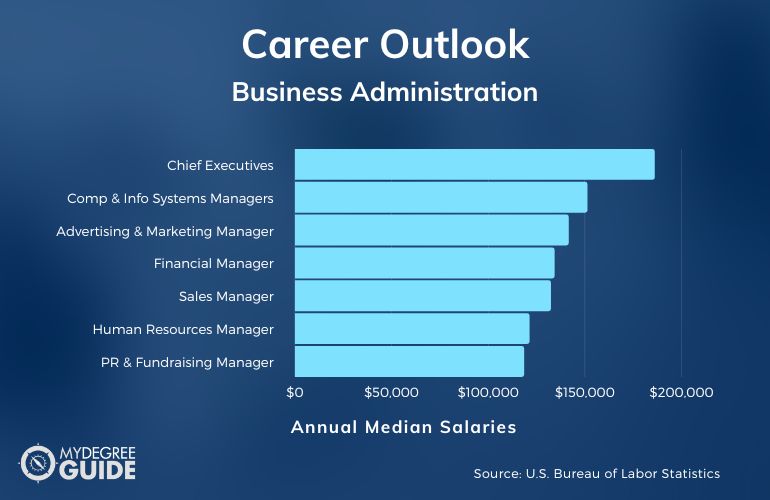What can you do with a Business Administration degree? Compare top-paying careers, salaries, job growth, and business degree specializations.

An on-campus or business degree online can help you put your keen “mind for business” to work in high-level settings. Yes, you’ll possibly be in the position to influence and oversee business operations at everything from research hospitals to worldwide conglomerates.
Editorial Listing ShortCode:
Of course, this bachelor’s degree path also puts you in a position to potentially get in on the ground level at a startup company. Consulting from home might also sound good to you!
Popular Business Administration Degrees
Click on the business majors that most interest you to jump to those sections:
- Accounting
- Business Administration
- Computer Information Systems
- Finance
- Human Resources
- Management
- Marketing
- Organizational Leadership
Yes, Business Administration covers quite a bit of ground. This is exactly why many students who pursue this degree path pivot to specialties. That means there’s room for you to work in the tech sector, production sector, banking sector, or marketing industry.
Accounting

You’re probably a by-the-book type of person if you’re interested in studying Business Administration with an emphasis on accounting. Yes, you might be leading an accounting department at a major corporation after completing this bachelor’s degree path.
Excelling at math can be very beneficial if you’re pursuing an accounting specialty. You’ll need to be able to crunch numbers to ensure that every dollar is being allocated as prudently as possible. You’re also probably going to be responsible for things like generating forecasts, setting department budgets, and providing quarterly numbers.
Editorial Listing ShortCode:
Working as a leader in the accounting field isn’t just about crunching the numbers. Leaders in this field are often tasked with discovering and implementing the best processes. This means making decisions regarding accounting software, technology, and team structures.
Business Administration

No, you don’t need to commit to a specialty when you study Business Administration. Some people prefer to pursue this degree in general terms because they are simply interested in the “mechanics” of the world of business.
A Business Administration program is designed to prepare students to manage and supervise business operations. This means covering the mechanisms and systems for producing good business results that have been studied for decades and emerging business trends.
This degree program should help you obtain an intense understanding of core business functions. A big emphasis will likely be placed on learning how to lead projects across an organization. Ultimately, you should learn how to lead and manage teams, departments, and entire organizations!
Editorial Listing ShortCode:
What makes a person a good fit for a Business Administration degree? It all starts with a deep fascination with the way businesses run.
Being endlessly curious and preoccupied with creating better systems for doing things are two traits that are often beneficial for people pursuing degrees in Business Administration. If you love to tackle projects, collaborate with people, and innovate at every step, this may be a good degree for you to pursue.
Don’t forget that understanding how to put the right person on each task will also be a key element to your success as a business leader.
Computer Information Systems

You can’t separate business from technology today. That’s one of the reasons why a Business Administration degree with a specialty in information systems is such a strong major for many. This may be a smart option for someone who is having difficulty choosing between a business and IT major.
If you’re a tech-oriented person who doesn’t want to get stuck in the tech pigeonhole, this specialty may appeal to you. This may also appeal to you if you desire a leadership role at a tech firm.
Editorial Listing ShortCode:
All companies need business leaders with actual tech capabilities these days. Yes, you may be a rare find for employers and recruiters! In fact, you may find yourself in a role as an IT enterprise architect or head of an IT department.
Finance

A Business Administration degree with a finance specialty may be a good place to start if you have the thought of becoming a CFO in the back of your mind. This option can help put you in a good place to be a person who can make decisions based on the numbers. Isn’t that what business is all about?
You may want to strongly consider business administration programs with an emphasis on finance if you’re interested in working in banking, financial services, or corporate finance. Yes, this is one of the majors that many people on Wall Street have.
Editorial Listing ShortCode:
This may a good fit if you feel comfortable making sense of numbers. Projections, models, and huge collections of data shouldn’t scare you if you’re interested in this specialty. The prerequisite is that you’re highly capable in mathematics.
Simply put, getting into business finance may be a great fit if you have a knack for turning raw numbers into actionable information.
Human Resources

Do you feel drawn more to the “people” side of business? Running a good business isn’t always about the numbers. After all, talent is any enterprise’s greatest asset.
A Business Administration major with a human resources focus can help you yourself up to manage all of the aspects of utilizing human capital. It can help you become an expert at looking out for the best interests of enterprises and staff simultaneously.
Editorial Listing ShortCode:
Bring your interpersonal skills, ability to move pieces around, and appetite for negotiation to the table! A leader in human resources deals with labor issues, contracts, benefits implementation, safety, compliance, and training.
Those in this role are important because they create and implement systems that allow people to do their jobs as safely and effectively as possible. It’s very helpful to be an extremely detail-oriented person in this role because it requires constantly tending to policies and compliance requirements that cannot be “skimmed over.”
Management

A Business Administration degree with management specialty often works well for someone who has a business management or CEO track in mind. This may be your chance to study professional leadership. This may be an ideal fit if you know yourself to be someone who strategizes and “rallies the troops” naturally.
Most business administration programs will likely focus on leadership theories and practices. Many programs place a heavy emphasis on case studies that demonstrate the successes and failures of companies. Ultimately, this degree should train you in effective business management techniques.
Editorial Listing ShortCode:
Some of the topics that management students learn about include resource allocations, employee coaching, project life cycles, production phases, and marketing. In fact, you should find that this specialty tends to sprinkle in a “little bit of everything” to prepare you for the fact that managers in corporate settings tend to do a little bit of everything!
Marketing

Studying Business Administration with a marketing emphasis may work well for you if you know you want to work in something like product marketing. This may be a great path to a role as a brand manager.
Typically, this specialty attracts people who feel just a little too creative to go for a pure business degree. You may be attracted to the idea of understanding how to market and distribute products through the right channels. That may put you more on the “business” side of a company than someone who simply works on marketing campaigns.
Editorial Listing ShortCode:
You may be a good fit for this degree path if you’re great at building relationships and collaborating. A big part of business marketing involves building strategic partnerships and understanding how to leverage market position.
Organizational Leadership

Business Administration with an organizational leadership spin can help you become the force behind a company’s momentum. You may be the manager who leads the managers in this role.
Do you love moving pieces around on the board? Are you good at setting and reaching goals? You may be able to apply those analytical skills to the big picture as an organizational leader.
Editorial Listing ShortCode:
Those in organizational leadership roles set strategic goals for entire organizations. In addition, they implement benchmarks and measurement systems to make sure departments and individuals are successfully working toward those goals!
It takes a mix of strong insights, an ability to understand data, and heavy motivational skills to be an effective leader in this type of role. This option probably appeals to you if you have an obsession with motivation. You may also find that you’re simply good at understanding how to manage workflows and allocate resources wisely.
10 Things You Can Do With a Business Administration Degree

What might your career look like in the real world after you graduate with a Business Administration degree? Here’s a look at 10 realistic roles that might be part of your career trajectory:
- Brand Manager
- Chief Executive Officer (CEO)
- Chief Financial Officer (CFO)
- Financial Analyst
- Manager of Strategic Partnerships
- Market Research Analyst
- IT Systems Architect & Manager
- Sales Manager
- Project Manager
- Vice President of Human Resources
Most companies and corporations have highly specific job roles, such as market research analysts, based on the products, services, and markets involved.
The one thing that almost every role is going to have in common is that you’re part of bringing a bigger picture to fruition using your highly specialized people and analytical skills.
Business Administration Careers and Salaries

Let’s talk about what you’re looking at for salary expectations at various stages of your career.
Entry Level Business Administration Jobs
How much will you make right after you graduate with a degree in Business Administration? Here’s a look at some roles you may be able to jump into after graduation and their average salaries.
- Computer Systems Analyst: $93,730
- Accountant and Auditor: $73,560
- Business Operations Specialist: $77,420
- Market Research Analysts: $65,810
- Human Resources Specialist: $63,490
All job market and salary data is provided by the U.S. Bureau of Labor Statistics.
Some entry level positions may only require an associates degree in business administration, however, a bachelor’s degree can definitely prepare you better and potentially help you move up the ladder quicker.
Mid-Career Business Administration Jobs

A few years in your field can do wonders for your earning potential in the business job market.
Here’s a look at some average salary expectations for roles that may open up at the mid-career level:
- Sales Manager: $132,290
- Human Resources Manager: $121,220
- Public Relations and Fundraising Manager: $118,430
- Management Analyst: $87,660
Using a Business Administration degree to pivot to a management track may be one of the best ways to expand income potential.
Highest Paying Business Administration Jobs

Some people go “all the way to the top” with their Business Administration degrees.
Here’s what average high-level business management and executive salaries could look like based on figures from the Bureau of Labor Statistics:
- Chief Executive: $185,950
- Computer and Information Systems Managers: $151,150
- Advertising, Promotions, and Marketing Managers: $141,490
- General and Operations Manager: $103,650
- Financial Manager: $134,180
There are opportunities for business-planning, market research analysts, and leadership roles everywhere from emerging startup companies to well-established corporations.
Licensure and Certifications

Will you be done with building your skills once you graduate with a degree in Business Administration? The reality is that staying relevant in your field may require you to keep up with various licensures and certifications. Here’s a look at the important ones:
- Project Management Professional (PMP) is an internationally recognized designation that proves a person has the specific skills needed to lead. PMPs report earning up to 25 percent more than non-certified project managers and professionals.
- A Certified Public Accountant (CPA) has passed the CPA examination. In addition, CPAs can go on to obtain CPA licenses after passing all requirements from a board of accountancy.
- A Chartered Financial Analyst has earned this designation from the CFA Institute. This designation signals that a person has demonstrated a commitment to ethics and professionalism. The stringent requirements for obtaining this honor include passing a CFA exam, achieving work experience, supplying letters of reference, and submitting a comprehensive application.
- A Certified Manager (CM) via the Institute of Certified Management Professionals has passed a series of three CM exams, completed relevant work experience, and demonstrated competency. A business management role is not necessarily required to qualify for this certification.
- A Certified Business Administrator designation via the American Certification Institute requires a person to complete a certification program consisting of four modules and 80 multiple-choice questions. The areas covered during the intensive process are Dynamic Modern Organization, Management Practices & Office Administration, Human Resource Management & Organizational Behavior, and Customer Service.
Obtaining these certifications and licensures often requires months of study, practice, and dedication.
Employers often use these designations to measure an applicant’s enthusiasm and competency. What’s more, something like a CPA designation may actually be required for certain job roles.
Business Administration Professional Organizations

Being a business leader means knowing how to move around in the business world. No leader is an island. That’s why professional organizations are considered so essential for everything from networking to training.
Here’s a look at the professional organizations every business leader needs to know about:
- The American Association of Finance and Accounting (AAFA) is an alliance of executive search firms that specialize in the recruiting and staffing of professionals in the worlds of finance and accounting. This can be an incredible organization to be aligned with when searching for high-level jobs around the country.
- The National Association for Business Economics (NABE) is the most prominent professional association for business economists. It is highly regarded for its conferences, offerings for educational and career development, industry surveys, and networking opportunities. NABE counts influential economists like Alan Greenspan among its list of past presidents.
- The American Marketing Association (AMA) is an organization that connects and empowers marketers. The organization focuses on bringing together thought leaders to identify and solve the problems of tomorrow. Members see themselves and being part of a “marketplace of knowledge.”
- The American Institute of Certified Public Accountants (AICPA) is the official professional organization of Certified Public Accountants in the United States. The organization provides resources and advocacy to help CPAs succeed in their roles.
- The American Business Women’s Association (ABWA) is a national professional association for women that has been in existence since 1949. The organization hosts more than 5,000 business and networking conferences around the county each year with the goal of bringing together women across a diverse range of industries and occupations. The organization also offers leadership resources and national recognition for professional women.
- The Society for Human Resource Management (SHRM) is a highly respected organization that provides a number of high-level professional certifications for HR professionals. HR professionals can take advantage of a multitude of learning and professional resources upon obtaining membership.
- The American Management Association (AMA) is an American educational membership organization that has trained millions of professionals around the world. Membership unlocks access to training courses and seminars led by highly vetted, expert faculty members. AMA also advocates for management professionals.
Professional organizations offer important resources for ongoing learning and training. Membership in a relevant organization is really one of the best ways to stay informed about the trends and issues that are impacting your industry. What’s more, many professionals use these organizations to land contacts and learn about job openings.
Business Programmatic Accreditation

It’s important to look into the accreditation behind the Business Administration program you choose and compare AACSB vs. ACBSP accreditation.
Association to Advance Collegiate Schools of Business (AACSB)
The first programmatic accreditor to know about is the Association to Advance Collegiate Schools of Business (AACSB). This highly respected accreditor was founded in 1918 specifically to provide accreditation to business schools.
A school with AACSB accreditation has been evaluated for key indicators that prove students are receiving an education that can equip them to be functional and effective leaders in the world of business.
Accreditation Council for Business Schools and Programs (ACBSP)
The Accreditation Council for Business Schools and Programs (ACBSP) is an organization offering accreditation services to on campus and online business programs.
This agency specifically looks at student outcomes at business programs around the globe. It currently provides accreditation at more than 1,000 campuses.
What Kind of Jobs Can I Get With a Business Administration Degree?

A Business Administration degree can help learners jump into analyst roles, managerial positions, project-oriented jobs, and sales roles.
This is a degree path that is often chosen by executive-minded college students. Adding a specialty to your degree can help you pivot toward anything from human resources to IT.
Is a Business Administration Degree Good?
A Business Administration degree is considered by many to be a solid track by all accounts.
According to the Bureau of Labor Statistics, employment for business and financial operations occupations is projected to grow 5% through the next 10 years. That’s faster than the average for all occupations.
Business Administration is a major that has historically opened up opportunities to step into management and leadership roles within organizations.
The coursework done for this degree focuses heavily on creating strategic growth. Business graduates are expected to be knowledgeable about business trends, strategic planning, and enterprise management.
How Much Money Can You Make With a Business Administration Degree?

The median annual wage for business and financial occupations stands at $72,250 (Bureau of Labor Statistics). You may find once you enter your chosen field that six-figure salaries are pretty standard for many roles.
Business graduates who get into sales or product-focused roles at financial or consumer-goods companies can often look forward to quarterly or annual performance bonuses.
This is something that sets this degree apart from many other highly technical degrees.
Should I Pursue a Career in Business Administration?
This is often one of the best career paths for those who know they want to work in a business or corporate setting.
This can also be a very useful bachelor’s degree path if you have a vision of starting your own company one day.
The core business principles and strategies that you study while pursuing your degree can help you set up a foundation for understanding what makes businesses succeed or fail.
What Industry Sectors Can You Work in With a Business Administration Degree?

The financial and corporate sectors are the obvious choices after graduating with a Business Administration degree. You may find that you have an easier time being recruited by major companies than your peers with other types of degrees after graduation. Large firms often seek out business administration graduates.
The longer answer is that any industry that uses business principles needs business administration graduates with solid skills.
That means that as a you may find yourself working for everything from a clothing brand to a firm that handles retirement funds.
Yes, a Business Administration degree should help set you up with the basic principles for managing operations. Where you take that is up to you!
Don’t forget that a bachelor’s degree in business can also help open up doors for consulting work. This is something that you can do fully independently or through a larger consulting firm that provides assignments.
Getting Your Business Administration Degree Online

Is the business world calling? The reality is that it can be hard to break into a high-level business role unless you have that degree behind your name. In fact, it’s going to be almost impossible to get your resume seen for some roles unless you have a degree in business administration.
Pursuing a Business Administration bachelor’s degree online can be an incredible way to complete high-level courses that unlock the principles that guide the biggest corporations on the globe.
You may just find that your journey in the virtual classroom inspires you to find better ways to do business that you can incorporate into your class projects.
The future business leaders of tomorrow are in the classroom today. Find a program offering bachelors degrees online in Business Administration that’s going to help you get a seat at the conference table.
